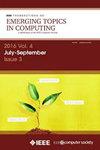SoSTA: Skill-Oriented Stable Task Assignment With Bidirectional Preferences in Crowdsourcing
IF 5.4
2区 计算机科学
Q1 COMPUTER SCIENCE, INFORMATION SYSTEMS
IEEE Transactions on Emerging Topics in Computing
Pub Date : 2025-03-13
DOI:10.1109/TETC.2025.3548672
引用次数: 0
Abstract
Traditional task assignment approaches in crowdsourcing platforms have focused on optimizing utility for workers or tasks, often neglecting the general utility of the platform and the influence of mutual preference considering skill availability and budget restrictions. This oversight can destabilize task allocation outcomes, diminishing user experience, and, ultimately, the platform’s long-term utility and gives rise to the Worker Task Stable Matching (WTSM) problem. To solve WTSM, we propose the Skill-oriented Stable Task Assignment with a Bi-directional Preference (SoSTA) method based on deferred acceptance strategy. SoSTA aims to generate stable allocations between tasks and workers considering mutually their preferences, optimizing overall utility while following skill and budget constraints. Our study redefines the general utility of the platform as an amalgamation of utilities on both the workers’ and tasks’ sides, incorporating the preference lists of each worker or task based on their respective utility scores for the other party. SoSTA incorporates Multi Skill-oriented Stable Worker Task Mapping (Multi-SoS-WTM) algorithm for contributions with multiple skills per worker. SoSTA is rational, non-wasteful, fair, and hence stable. SoSTA outperformed other approaches in the simulations of the MeetUp dataset. SoSTA improves execution speed by 80%, task completion rate by 60%, and user happiness by 8%.众包中具有双向偏好的技能导向稳定任务分配
在众包平台中,传统的任务分配方法侧重于优化工人或任务的效用,往往忽略了平台的一般效用以及考虑技能可用性和预算限制的相互偏好的影响。这种疏忽会破坏任务分配结果的稳定性,降低用户体验,最终影响平台的长期效用,并导致工作任务稳定匹配(Worker task stability Matching, WTSM)问题。为了解决WTSM问题,我们提出了基于延迟接受策略的双向偏好(SoSTA)的技能导向稳定任务分配方法。SoSTA的目标是在任务和工人之间产生稳定的分配,考虑他们的相互偏好,在遵循技能和预算约束的同时优化整体效用。我们的研究将平台的一般效用重新定义为工人和任务双方效用的合并,结合每个工人或任务的偏好列表,基于他们各自对另一方的效用得分。SoSTA结合了面向多技能的稳定工人任务映射(Multi- sos - wtm)算法,用于每个工人的多技能贡献。SoSTA是理性的、不浪费的、公平的,因此是稳定的。在MeetUp数据集的模拟中,SoSTA优于其他方法。SoSTA将执行速度提高了80%,任务完成率提高了60%,用户满意度提高了8%。
本文章由计算机程序翻译,如有差异,请以英文原文为准。
求助全文
约1分钟内获得全文
求助全文
来源期刊

IEEE Transactions on Emerging Topics in Computing
Computer Science-Computer Science (miscellaneous)
CiteScore
12.10
自引率
5.10%
发文量
113
期刊介绍:
IEEE Transactions on Emerging Topics in Computing publishes papers on emerging aspects of computer science, computing technology, and computing applications not currently covered by other IEEE Computer Society Transactions. Some examples of emerging topics in computing include: IT for Green, Synthetic and organic computing structures and systems, Advanced analytics, Social/occupational computing, Location-based/client computer systems, Morphic computer design, Electronic game systems, & Health-care IT.
 求助内容:
求助内容: 应助结果提醒方式:
应助结果提醒方式:


